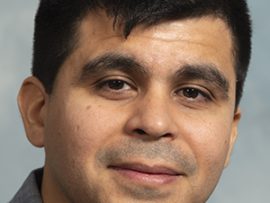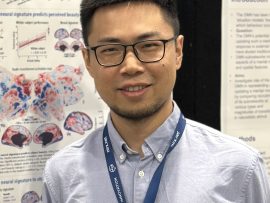Professor Jianfeng Feng
Jianfeng Feng is the Professor of Computer Science at Warwick University, the chair professor of Shanghai National Centre for Mathematic Sciences, the Dean of Institute of Science and Technology for Brain-Inspired Intelligence in Fudan University, and the Dean of the School of Data Science in Fudan University.
Feng has spent much of his career working on developing new mathematical, statistical and computational theories and methods to meet the challenges raised in neuroscience and mental health researches. He has made considerable contributions on modelling single neurons and neuronal networks, brain-inspired machine learning algorithms, stochastic control and causality analysis with many publications on Cell, Nature Medicine, Nature Human Behaviours, Nature Computational Science, Nature Aging, Nature Mental Health etc. His recent research interests are mainly in exploring human brain based upon data and experiments, having developed the world first digital twin brain (DTB), and working on brain-inspired AI algorithms for applications. He was awarded the prestigious Royal Society Wolfson Research Merit Award, and invited to deliver 2019 Paykel Lecture at the Cambridge University. In 2023, he was awarded Humboldt Research Award.
Select publications
- A rigorous analysis of Linsker-type Hebbian learning.
Feng JF, Pan, H and Roychowdhury V. P. (1994) Advances in Neural Information Processing Systems, 7.
The First NeurIPS Conference Paper from China. - Simulation and assimilation of the digital human brain.
Lu WL, et. al., Feng JF (2024) Nature Computational Science, 4(12), 890–898.
We present the Digital Twin Brain (DTB), a platform for simulating spiking neuronal networks at the large neuron scale of the human brain based on personalized magnetic-resonance-imaging data and biological constraints. The DTB aims to reproduce both the resting state and certain aspects of the action of the human brain. - Atlas of the plasma proteome in health and disease in 53,026 adults (lead corresponding author).
Deng YT, et. al., (2025) Cell, 188(1), 253–271.e7.
We developed the world first protein atlas for human. These results provide an open-access comprehensive proteome-phenome resource (https://proteome-phenome-atlas.com/) to help elucidate the biological mechanisms of diseases and accelerate the development of disease biomarkers, prediction models, and therapeutic targets. - Plasma proteomic profiles predict future dementia in healthy adults (corresponding author).
Guo Y, et al., (2024) Nature Aging, 4:247-260.
By developing novel AI algorithms, we are aiming to finding reliable and early biomarkers for the disease, which subsequently led to many publications in Nature Human Behaviours, Alzheimers & Dementia and others. We can predict dementia with an AUC of 91% and 15 years before the onset. - Plasma proteomic signatures of social isolation and loneliness associated with morbidity and mortality.
Shen C, et. al., Feng JF (2025) Nature Human Behaviour, 1-15.
We characterized protein signatures in the blood associated with social isolation and loneliness, showing how these proteins link social isolation and loneliness to an increased risk of disease and mortality. - Associations of dietary patterns with brain health from behavioral, neuroimaging, biochemical and genetic analyses.
Zhang R, et al. Feng JF (2024) Nature Mental Health, 2(5):535-552.
This is one of the many topics in lifestyle we have explored, including social isolation and loneness in Neurology, the number of friends in eLife, reading for pleasure in Psychological Medicine, Suicide predictions in Nature Human Behaviours, Drinking and Smoking in eLife, etc. Many of them have wide media interests and often reported worldwide. - Identifying behaviour-related and physiological risk factors for suicide attempts in the UK Biobank.
Zhang B, et. al., Feng JF (2024) Nature Human Behaviour, 8(9), 1784-1797.
This study identified the most comprehensive set of behavior-related and physiological factors associated with suicide attempts. Furthermore, we developed a machine-learning classification model based on behavior-related factors, which demonstrated exceptional discriminatory accuracy in distinguishing individuals with and without suicide attempts (AUC = 0.909). - A shared neural basis underlying psychiatric comorbidity.
Xie C, et. al., Feng JF (2023) Nature Medicine, 29(5), 1232-1242.
The study is the first successful one following the idea of transdiagnostic approach and opens many possible future clinical applications.
Select awards
- 2005 – 2008: Yangtze Scholar, Ministry of Education of the People’s Republic of China
- 2011: Royal Society Wolfson Research Merit Award for ‘respected scientists of outstanding achievement and potential’
- 2019: Paykel Lecture, Department of Psychiatry, University of Cambridge, UK
- 2023: Humboldt Research Award (two in China in 2023), Germany
Further links
Website: http://www.dcs.warwick.ac.uk/~feng







